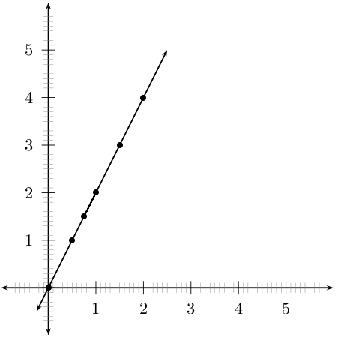| << Chapter < Page | Chapter >> Page > |
In earlier grades, you saw that variables can be related to each other. For example, Alan is two years older than Nathan. Therefore the relationship between the ages of Alan and Nathan can be written as , where is Alan's age and is Nathan's age.
In general, a relation is an equation which relates two variables. For example, and are relations. In both examples and are variables and 5 is a constant, but for a given value of the value of will be very different in each relation.
Besides writing relations as equations, they can also be represented as words, tables and graphs. Instead of writing , we could also say “ is always five times as big as ”. We could also give the following table:
| 2 | 10 |
| 6 | 30 |
| 8 | 40 |
| 13 | 65 |
| 15 | 75 |
Complete the following table for the given functions:
| 1 | |||
| 2 | |||
| 3 | |||
| 50 | |||
| 100 |
When working with real valued functions, our major tool is drawing graphs. In the first place, if we have two real variables, and , then we can assign values to them simultaneously. That is, we can say “let be 5 and be 3”. Just as we write “let ” for “let be 5”, we have the shorthand notation “let ” for “let be 5 and be 3”. We usually think of the real numbers as an infinitely long line, and picking a number as putting a dot on that line. If we want to pick two numbers at the same time, we can do something similar, but now we must use two dimensions. What we do is use two lines, one for and one for , and rotate the one for , as in [link] . We call this the Cartesian plane .

In order to draw the graph of a function, we need to calculate a few points. Then we plot the points on the Cartesian Plane and join the points with a smooth line.
Assume that we were investigating the properties of the function . We could then consider all the points such that , i.e. . For example, and would all be such points, whereas would not since . If we put a dot at each of those points, and then at every similar one for all possible values of , we would obtain the graph shown in [link]

The form of this graph is very pleasing – it is a simple straight line through the middle of the plane. The technique of “plotting”, which we have followed here, is the key element in understanding functions.
Plot the following points and draw a smooth line through them.(-6; -8),(-2; 0), (2; 8), (6; 16)
Thus far you would have seen that we can use
to represent a function. This notation however gets confusing when you are working with more than one function. A more general form of writing a function is to write the function as
, where
Both notations will be used in this book.
If , find in terms of .
We have now simplified the function in terms of .

Notification Switch
Would you like to follow the 'Siyavula textbooks: grade 10 maths [ncs]' conversation and receive update notifications?